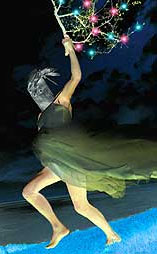
| HOME |
| NERVE |
| REVIEWS |
| ARCHIVE |
| EVENTS |
| LINKS |
| ABOUT US |
| CONTRIBUTORS |
| BACK ISSUES |
| CONTACT US |
 The
Bacchae
The
Bacchae
Written by Euripides, adapted by Carl Grose and Anna Maria Murphy,
Directed by Emma Rice
Kneehigh Theatre Company
Liverpool Playhouse, 19th-23rd October 2004
Reviewed by Julian Bond
Where to start? Some facts. This version of the Cornish Theatre group, collaborating with the West Yorkshire Playhouse, directed by Emma Rice, was based on a text by Carl Grose and Ann Marie Murphy, taking the plot of Euripides’ play, but using popular contemporary vernacular.
Fact: the audience seemed to enjoy it greatly, there was a large drama college contingent who found the double entendres amusing as the performers competently wove their way through the scenes, intending to illuminate this tale of Dionysus in hedonistic passion come to Thebes to liberate the citizens from overpowering reason, and - no small point - be rightfully recognised as a God. Pentheus - the authoritarian ruler - induces the tragedy in refusing to give recognition, with his mother being manipulated by the gods to mistakenly slay him whilst in revelry. So much for the plot and so much for the play.
For as much as I would wish to say otherwise, the whole experience was dire, a dire production, a dire accompaniment to the current and longstanding vogue for (to use a phrase of Brecht’s) ‘culinary theatre‘, which despite appeasing Middle England has no cutting edge.
To locate it on the contemporary map, here are some of the influences which I noted throughout the performance: Mr Bean, ‘Jonathan Ross’s Friday Night Show’, pantomimes generally, (My mind travelled back to an excellent Peter Pan at the Palace Theatre, Manchester, some years ago, far superior to this Greek fast food fare), Dad’s Army, Noel Edmonds show, Young Ones student household, even ‘Blade’. We were also treated to a silly, safe, middle class view of black rap, offensive and absurd in equal measures.
With song lines such as “It’s a bad idea to put a god in gaol”, the show generally would have been a commendable production for an amateur dramatic production, but was simply unacceptable to me, though I’m obviously very much in the minority.
In truth the play was a victim of bad decision-making from the start in terms of the adaptation, style, and costume. It lacked any consistent or credible vision and to steal the words of the Chorus sung to Agave, slayer of her ruler-son “It might have been better for you, If you’d never been born”.
Enough said.